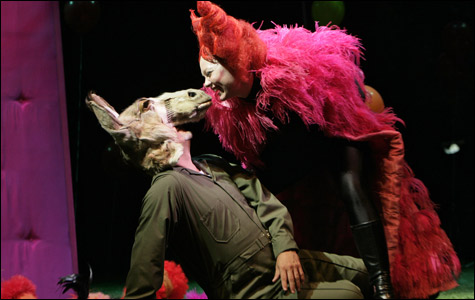 |
“Honey, I shrunk the Bard” was Citi Performing Arts Center’s message to Boston this year. The annual offering of free Shakespeare on Boston Common was boiled down to just seven performances and last year’s budget almost halved. The good news is that sometimes less is more when imagination rules — or at least shares dominion over A Midsummer Night’s Dream with fairy monarchs Oberon and Titania. There’s no putting a good face on the reduction of performances by Commonwealth Shakespeare Company, a “public program” of CPAC. Still, belt tightening was not altogether a bad thing in the bare-Bard-with-balloons staging of Dream that just closed on Boston Common. You can’t move into a balloon, as it seemed you might into the 1950s North End neighborhood setting of last summer’s The Taming of the Shrew. But on its smaller, grassy square of a stage (returned from the Parade Ground to the Parkman Bandstand), with one corner held aloft by a large balloon moon, its Athenian wood a forest of colorful helium spheres bobbing on gossamer strings of trunks, this Dream shimmered. And set designer Beowulf Boritt’s clever motif hung in to the end: in the “Pyramus and Thisby” travesty with which a troupe of proletarians (here Boston Parks Department employees marshaled by a cop) salutes the wedding finale, the Man in the Moon’s dog was a balloon animal and Thisby’s breasts were not silicone implants.

Director Steven Maler has been up to this outdoor-Shakespeare stuff for 11 years now, and he knows what works and what sacrifices are worth it. Given the necessary amplification, the Bard’s most luscious poetry lost its limpidity, and the distance of some of the audience from the action rendered a physically broad staging imperative. But in CSC’s Dream, which was choreographed by Anna Myer, the movement fluctuated between slapstick and the sublime. Antonio Edwards-Suarez’s agile Puck was a yellow satyr sprite with long fingers, hoof-like feet, pink thigh fur, and a body that seemed to ripple in the light. And if he looked slight, he had sufficient strength to hold the substantive fairy king of seasoned Shakespeare vet Johnny Lee Davenport aloft in a sort of bench-press flying angel. Then, when the athletic goblin exited the rear of the stage, he flew into the air and slid — at one point falling backward and head first!
In addition to the feud of the fairy royals (the imposing Davenport and Mimi Bilinski’s sensual if tough Catwoman of a Titania) and the dramatic endeavors of the working class, Shakespeare gives us not so much a love triangle as a love square. Demetrius, once affianced to Helena, has obtained paternal permission to marry Hermia, who loves Lysander. When Hermia and Lysander flee Athens and its rigid patriarchal laws, Demetrius is on their heels with Helena on his. Throwing herself at her spurning love, she beseeches him to “Use me but as your spaniel.” On the Common, this arguably degrading request set the tone for the feisty quartet, who cavorted like a litter of white-clad puppies. Each pursued the adored object of the moment (which changes as Puck plays incompetent Cupid with the juice of a “little western flower”) on knees or all fours. They leapt atop one another and batted perceived rivals from the stage like rubber balls, generally playing “Go fetch” with amore. The fairies, too, got in on the dog act, with Edwards-Suarez’s Puck sniffing more than intuiting human presence.